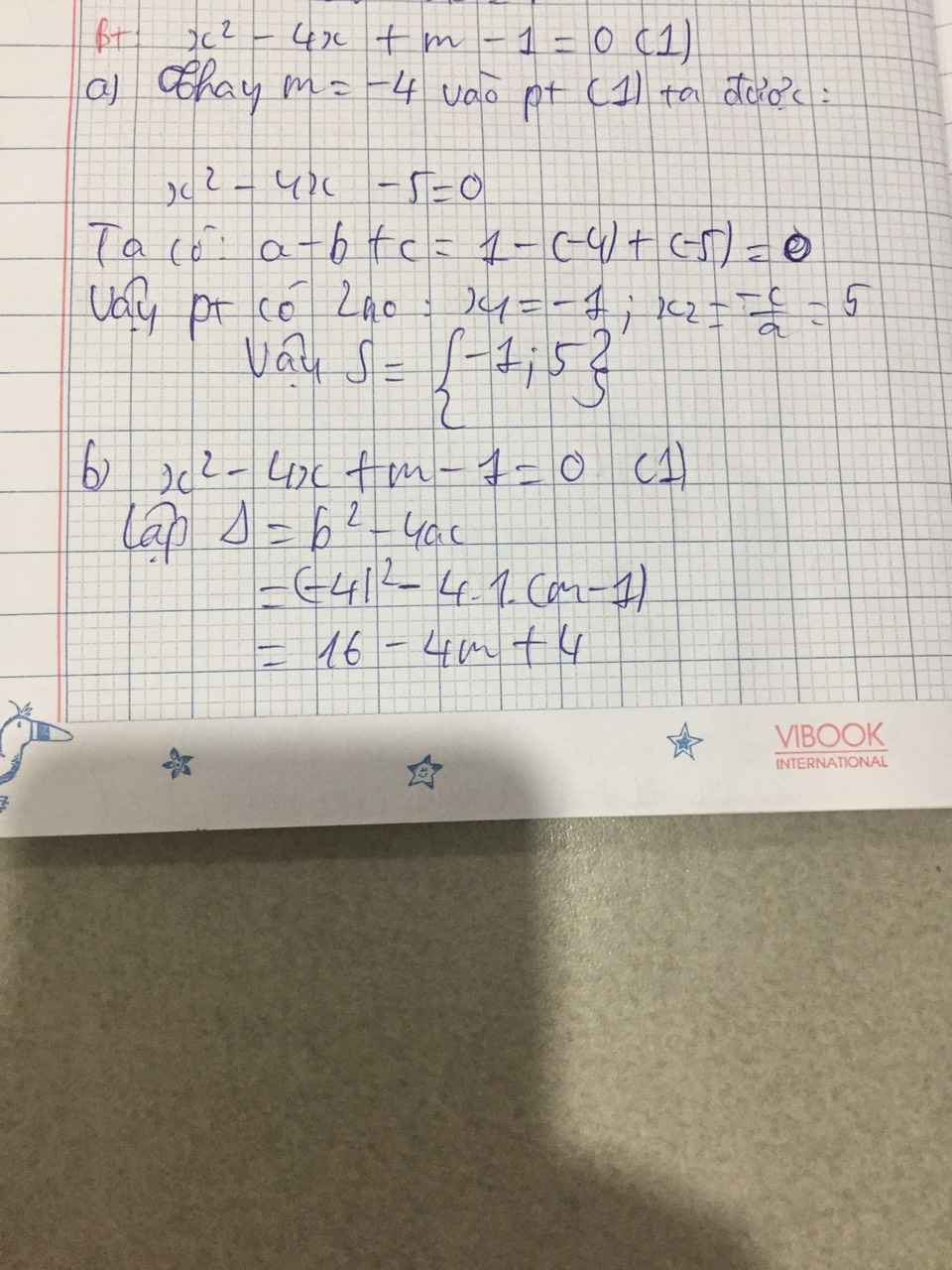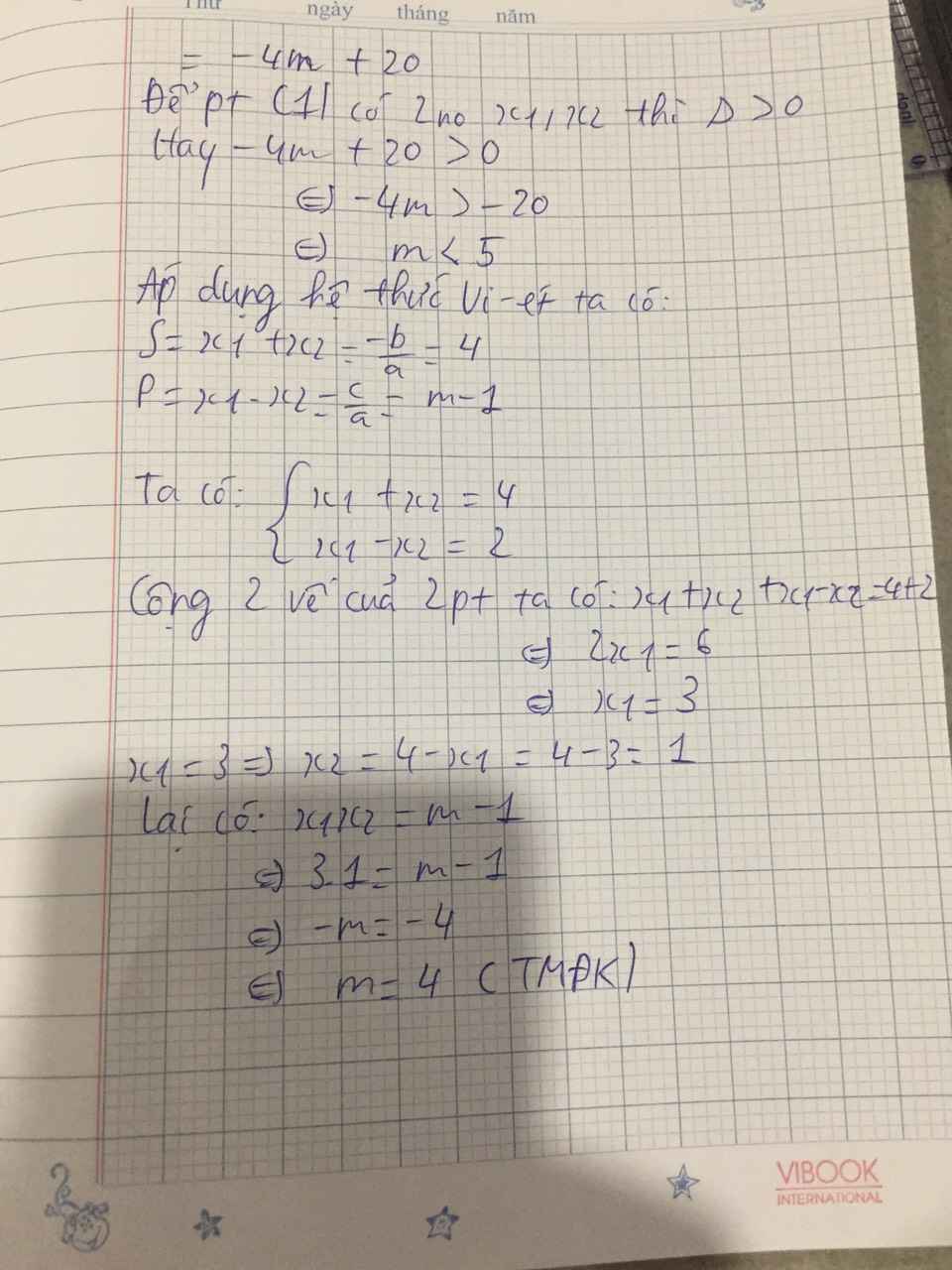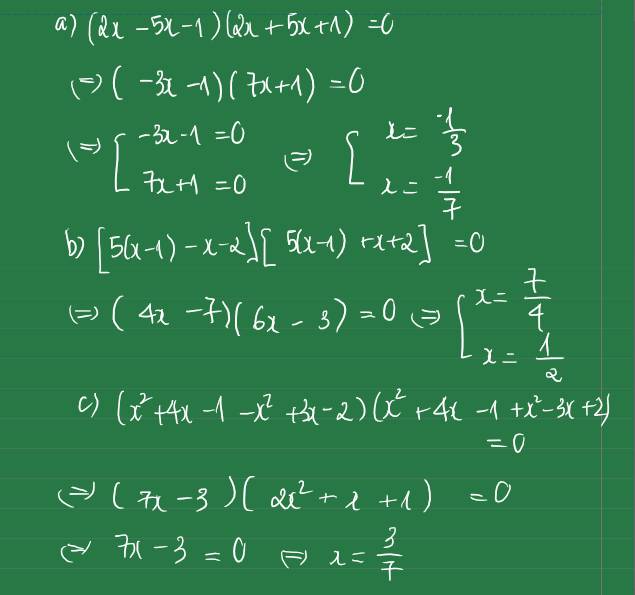Giải phương trình (x2+x+1)2=(4x-1)2

Những câu hỏi liên quan
Giải các phương trình sau: (2 x 2 + 1)(4x – 3) = (2 x 2 + 1)(x – 12)
Cho phương trình ẩn x : x2 - 4x + m -1 =0 (1)
a) Giải phương trình (1) với m = -4
b) Với x1,x2 là nghiệm phương trình (1). Tìm giá trị của m, biết x1-x2= 2
Giải các phương trình sau:
a/ (3x – 2)(4x + 5) = 0
b/ (2,3x – 6,9)(0,1x + 2) = 0
c/ (4x + 2)(x2 + 1) = 0
d/(2x + 7)(x – 5)(5x + 1) = 0
e/ (x – 1)(2x + 7)(x2 + 2) = 0
f/ (3x + 2)(x2 – 1) = (9x2 – 4)(x + 1)
a) \(\left(3x-2\right)\left(4x+5\right)=0\)
\(\Leftrightarrow\left[{}\begin{matrix}3x-2=0\\4x+5=0\end{matrix}\right.\)
\(\Leftrightarrow\left[{}\begin{matrix}x=\dfrac{2}{3}\\x=-\dfrac{5}{4}\end{matrix}\right.\)
Vậy: \(S=\left\{\dfrac{2}{3};-\dfrac{5}{4}\right\}\)
b) \(\left(2,3x-6,9\right)\left(0,1x+2\right)=0\)
\(\Leftrightarrow\left[{}\begin{matrix}2,3x-6,9=0\\0,1x+2=0\end{matrix}\right.\)
\(\Leftrightarrow\left[{}\begin{matrix}x=3\\x=-20\end{matrix}\right.\)
c) \(\left(4x+2\right)\left(x^2+1\right)=0\)
Vì \(x^2+1\ge1>0\forall x\)
\(\Rightarrow4x+2=0\)
\(\Leftrightarrow x=-\dfrac{1}{2}\)
Vậy: \(S=\left\{-\dfrac{1}{2}\right\}\)
d) \(\left(2x+7\right)\left(x-5\right)\left(5x+1\right)=0\)
\(\Leftrightarrow\left[{}\begin{matrix}2x+7=0\\x-5=0\\5x+1=0\end{matrix}\right.\)
\(\Leftrightarrow\left[{}\begin{matrix}x=-\dfrac{7}{2}\\x=5\\x=-\dfrac{1}{5}\end{matrix}\right.\)
Vậy: \(S=\left\{-\dfrac{7}{2};5;-\dfrac{1}{5}\right\}\)
e) \(\left(x-1\right)\left(2x+7\right)\left(x^2+2\right)=0\)
Vì \(x^2+2\ge2>0\forall x\)
\(\Rightarrow\left(x-1\right)\left(2x+7\right)=0\)
\(\Leftrightarrow\left[{}\begin{matrix}x-1=0\\2x+7=0\end{matrix}\right.\)
\(\Leftrightarrow\left[{}\begin{matrix}x=1\\x=-\dfrac{7}{2}\end{matrix}\right.\)
f) \(\left(3x+2\right)\left(x^2-1\right)=\left(9x^2-4\right)\left(x+1\right)\)
\(\Leftrightarrow\left(3x+2\right)\left(x-1\right)\left(x+1\right)-\left(3x-2\right)\left(3x+2\right)\left(x+1\right)=0\)
\(\Leftrightarrow\left[\left(3x+2\right)\left(x+1\right)\right].\left(x-1-3x+2\right)=0\)
\(\Leftrightarrow\left(3x^2+5x+2\right)\left(-2x+1\right)=0\)
\(\Leftrightarrow\left(3x^2+3x+2x+2\right)\left(-2x+1\right)=0\)
\(\Leftrightarrow\left[3x\left(x+1\right)+2\left(x+1\right)\right]\left(-2x+1\right)=0\)
\(\Leftrightarrow\left(x+1\right)\left(3x+2\right)\left(-2x+1\right)=0\)
\(\Leftrightarrow\left[{}\begin{matrix}x+1=0\\3x+2=0\\-2x+1=0\end{matrix}\right.\)
\(\Leftrightarrow\left[{}\begin{matrix}x=-1\\x=-\dfrac{2}{3}\\x=\dfrac{1}{2}\end{matrix}\right.\)
Vậy: \(S=\left\{-1;-\dfrac{2}{3};\dfrac{1}{2}\right\}\)
Đúng 2
Bình luận (0)
Giải phương trình
1) x2+4-2(x-1) = (x-2)^2
2) x+3/x-3 - x-1/x+3 = x2+4x+6/x2-9
3) 3x-3/x2-9 -1/x-3 = x+1/x+3
Xem chi tiết
1) `x^2+4-2(x-1)=(x-2)^2`
`<=>x^2+4-2x+2=x^2-4x+4`
`<=>-2x+2=-4x`
`<=>2x=-2`
`<=>x=-1`
.
2) ĐKXĐ: `x \ne \pm 3`
`(x+3)/(x-3)-(x-1)/(x+3)=(x^2+4x+6)/(x^2-9)`
`<=>(x+3)^2-(x-1)(x-3)=x^2+4x+6`
`<=>x^2+6x+9-x^2+4x-3=x^2+4x+6`
`<=>10x+6=x^2+4x+6`
`<=>x^2-6x=0`
`<=>x(x-6)=0`
`<=>x=0;x=6`
.
3) ĐKXĐ: `x \ne \pm 3`
`(3x-3)/(x^2-9) -1/(x-3 )= (x+1)/(x+3)`
`<=>(3x-3)-(x+3)=(x+1)(x-3)`
`<=> 2x-6=x^2-2x-3`
`<=>x^2-4x+3=0`
`<=>x^2-x-3x+3=0`
`<=>x(x-1)-3(x-1)=0`
`<=>(x-3)(x-1)=0`
`<=> x=3;x=1`
Vậy...
Đúng 1
Bình luận (0)
Giải các phương trình sau:
g/ x(x + 3)(x – 3) – (x + 2)(x2 – 2x + 4) = 0
h/ (3x – 1)(x2 + 2) = (3x – 1)(7x – 10)
i/ (x + 2)(3 – 4x) = x2 + 4x + 4
k/ x(2x – 7) – 4x + 14 = 0
m/ x2 + 6x – 16 = 0
n/ 2x2 + 5x – 3 = 0
\(m,x^2+6x-16=0\)
\(\Leftrightarrow x^2-2x+8x-16=0\)
\(\Leftrightarrow x\left(x-2\right)+8\left(x-2\right)=0\)
\(\Leftrightarrow\left(x+8\right)\left(x-2\right)=0\)
\(\Leftrightarrow\left[{}\begin{matrix}x+8=0\\x-2=0\end{matrix}\right.\)
\(\Leftrightarrow\left[{}\begin{matrix}x=-8\\x=2\end{matrix}\right.\)
\(n,2x^2+5x-3=0\)
\(\Leftrightarrow2x^2-x+6x-3=0\)
\(\Leftrightarrow x\left(2x-1\right)+3\left(2x-1\right)=0\)
\(\Leftrightarrow\left(x+3\right)\left(2x-1\right)=0\)
\(\Leftrightarrow\left[{}\begin{matrix}x+3=0\\2x-1=0\end{matrix}\right.\)
\(\Leftrightarrow\left[{}\begin{matrix}x=-3\\x=\dfrac{1}{2}\end{matrix}\right.\)
Đúng 2
Bình luận (0)
\(k,x\left(2x-7\right)-4x+14=0\)
\(\Leftrightarrow2x^2-4x-7x+14=0\)
\(\Leftrightarrow2x\left(x-2\right)-7\left(x-2\right)=0\)
\(\Leftrightarrow\left(2x-7\right)\left(x-2\right)=0\)
\(\Leftrightarrow\left[{}\begin{matrix}2x-7=0\\x-2=0\end{matrix}\right.\)
\(\Leftrightarrow\left[{}\begin{matrix}x=\dfrac{7}{2}\\x=2\end{matrix}\right.\)
Đúng 2
Bình luận (1)
Xem thêm câu trả lời
Giải các phương trình sau
a) 4x2-(5x+1)2=0
b) 25(x-1)2-(x+2)2=0
c) (x2+4x-1)2-(x2-3x+2)20
a: =>(2x-5x-1)(2x+5x+1)=0
=>(-3x-1)(7x+1)=0
=>x=-1/3 hoặc x=-1/7
b: =>(5x-5)^2-(x+2)^2=0
=>(5x-5-x-2)(5x-5+x+2)=0
=>(4x-7)(6x-3)=0
=>x=1/2 hoặc x=7/4
c: =>(x^2+4x-1-x^2+3x-2)(x^2+4x-1+x^2-3x+2)=0
=>(7x-3)(2x^2+x+1)=0
=>7x-3=0
=>x=3/7
Đúng 0
Bình luận (0)
Giải các bất phương trình sau:
a) -2x2 + 7x - 10 < 0
b) \(\dfrac{1+x}{1-x}\) ≤ 2
c) \(\dfrac{x}{x-2}-\dfrac{2}{x-3}\) > 1
d) (x2 + 4x + 10)2 - 7(x2 + 4x + 11) + 7 < 0
Giải các phương trình:
4
x
+
1
-
x
2
-
x
+
2
x
+
1
x
+
2
Đọc tiếp
Giải các phương trình: 4 x + 1 = - x 2 - x + 2 x + 1 x + 2

Điều kiện xác định: x ≠ -1; x ≠ -2.
Quy đồng và khử mẫu ta được:
4.(x + 2) = -x2 – x + 2
⇔ 4x + 8 = -x2 – x + 2
⇔ 4x + 8 + x2 + x – 2 = 0
⇔ x2 + 5x + 6 = 0.
Có a = 1; b = 5; c = 6 ⇒ Δ = 52 – 4.1.6 = 1 > 0
⇒ Phương trình có hai nghiệm phân biệt:

Chỉ có nghiệm x2 = -3 thỏa mãn điều kiện xác định.
Vậy phương trình có nghiệm x = -3.
Đúng 0
Bình luận (0)
Giải các bất phương trình sau
a) (x2+2)2-(x+2)(x-2)(x2+4)-4x(x+1)< hoặc = 20
b) (x+2)(x2-2x+4)-x(x2+2)> hoặc = 15
a) \(\left(x^2+2\right)^2-\left(x+2\right)\left(x-2\right)\left(x^2+4\right)-4x\left(x+1\right)\le20\)
\(\Leftrightarrow x^4+4x^2+4-x^4+16-4x^2-4x\le20\)
\(\Leftrightarrow\left(x^4-x^4\right)+\left(4x^2-4x^2\right)-4x+4+16\le20\)
\(\Leftrightarrow-4x+20\le20\)
\(\Leftrightarrow-4x\le20-20\)
\(\Leftrightarrow-4x\le0\)
\(\Leftrightarrow-4x:-4\ge0:-4\)
\(\Leftrightarrow x\ge0\)
Vậy nghiệm của bất phương trình là: \(x\ge0\)
b) \(\left(x+2\right)\left(x^2-2x+4\right)-x\left(x^2+2\right)\ge15\)
\(\Leftrightarrow x^3+8-x^3-2x\ge15\)
\(\Leftrightarrow\left(x^3-x^3\right)+8-2x\ge15\)
\(\Leftrightarrow8-2x\ge15\)
\(\Leftrightarrow-2x\ge15-8\)
\(\Leftrightarrow-2x\ge7\)
\(\Leftrightarrow-2x:-2\le7:-2\)
\(\Leftrightarrow x\le-\dfrac{7}{2}\)
Vậy nghiệm của bất phương trình là \(x\le-\dfrac{7}{2}\)
Đúng 3
Bình luận (0)
a: =>x^4+4x^2+4-x^4+16-4x^2-4x<=20
=>-4x+20<=20
=>-4x<=0
=>x>=0
b: =>x^3+8-x^3-2x>=15
=>-2x>=7
=>x<=-7/2
Đúng 0
Bình luận (0)

























